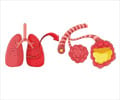Highlights
- Residual pneumonia can be treated with oral antibiotic therapy instead of intravenous method
- 3.2% failure rate in intravenous method of drug delivery while treating children discharged from the hospital with 7.1% risk of complication.
- 2.6% failure rate in children on oral antibiotics with 0.6% adverse drug reaction.
Residual Disease
A retrospective study was conducted on 2,123 children across 36 hospitals and it was found that oral antibiotics were as effective as intravenous antibiotics in managing residual pneumonia in children.
Limitations of Using Intravenous Antibiotics
- Chances of infection at the site of injection are high
- Flow rates need to be monitored diligently: Exceeding the flow rates could lead to complications.
- Children may move or shake during intravenous antibiotic therapy at home, resulting in injury
- Intravenous antibiotic therapy would require careful monitoring at home and sterile environment.
Dr. Samir Shah who is the lead author of the study said “PICC line complications can be serious, resulting in hospital readmission, additional procedures, and more medications, as well as missed work or school.” Cincinnati Children’s Director of Hospital Medicine, Dr. Shah further added “It’s not surprising that children and families would rather not use PICC lines. Our findings, which provide compelling evidence to support the use of oral antibiotics for children with complex pneumonia, will contribute to safer care for children across the country.”
2,123 children were included in the study:
- 281 children, 13.6% of the children were prescribed intravenous antibiotics after they were discharged.
- 3.2% failure rate was noticed among children on a peripherally inserted central venous catheter (PICC) line
- 2.6% failure rate was noticed among children on oral antibiotics.
- PICC associated complications were seen in 7.1% of the people.
- Drug related complications were seen in 0.6% of patients on oral antibiotics.
Complex Pneumonia
Complex pneumonia is a condition in which there is collection of fluid in the pleural space during an underlying infection of pneumonia. In some cases there is pus in the pleural membrane. This type of complex pneumonia is generally seen in 6 to 8% of community acquired pneumonia.Staphylococcus aureus is known to cause a more severe necrotizing form of disease along with increased empyema.
References:
- Complicated Pneumomnia - (http://peds.stanford.edu/Rotations/blue_team/documents/Complicated_Pneumonia_Info.pdf)
- CT and MR Angiography: Comprehensive Vascular Assessment; Geoffrey D Rubin et al;
















